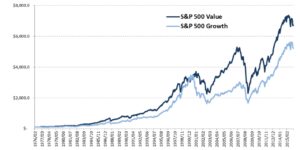When it comes to stocks, there are a few key things that you need to know to make informed investment decisions. One of those things is understanding what it means for a stock to be "overvalued.", and what are the advantages and disadvantages of overvalued stocks.
We will discuss the pros and cons of investing in overvalued stocks. We'll also answer some common questions about these types of stocks, such as "why would anyone buy them?" and "is it better to buy undervalued or overvalued stocks?" So if you're curious about overvalued stocks and want to learn more.
What is an overvalued stock?
An overvalued stock is a stock that is trading at a price that is higher than its intrinsic value. In other words, the market has "priced in" too much growth potential for the company, and as a result, the stock price is not justified by the company's current fundamentals.
For example, let's say that you believe Company XYZ is worth $100 per share. However, the current market price for XYZ stock is $120 per share. In this case, XYZ stock would be considered overvalued.
What are the advantages of overvalued stocks?
There are a few advantages of investing in overvalued stocks. First, if the stock price is truly overvalued in terms of the company's earnings, then there is potential for the stock price to increase in the future as the company's earnings grow.
Some ways that can cause earnings growth are if the company releases a new product, expands to new markets or completes an acquisition.
Second, overvalued stocks tend to have a strong community of investors and analysts following them. This can provide a level of support and stability for the stock, as well as provide information and insights that may not be available for other stocks.
Many of these investors may also be customers and vice versa, which can create a virtuous circle for the company.
Third, you can short overvalued stocks, which means you can profit if the stock price falls. If the market realizes that a stock is overvalued and the price falls, you can make money by betting against the stock.
Finally, overvalued stocks tend to be more volatile than other stocks, which means that they may provide more opportunities for short-term profits through day-trading or other strategies.
What are the disadvantages of overvalued stocks?
The biggest disadvantage of investing in overvalued stocks is that there is a greater risk of losing money. If the stock price doesn't fall back to its intrinsic value, you could end up holding onto the stock for a long time.
One of the biggest risks is that the company's fundamentals may not improve, and as a result, the stock price could continue to decline. Another disadvantage of overvalued stocks is that it can be difficult to find a buyer when you want to sell.
If the stock price falls below its intrinsic value, it may be hard to find a buyer willing to pay the price you want. Finally, even if the company begins to grow, the stock price may not increase at the same rate.
This is because the market has already priced in the company's expected growth. As a result, you may not see the same returns as you would if you had invested in a company with similar growth potential but were undervalued.
Is an overvalued stock good or bad?
This is a difficult question to answer, as it depends on the individual stock and circumstances. Generally speaking, an overvalued stock is trading at a price above its intrinsic value. This can be due to a variety of reasons, such as investor optimism or irrational exuberance. Overvalued stocks can be dangerous because they are at risk of a price correction.
This means that the stock price could drop suddenly and without warning. This can be devastating for unprepared investors. Overvalued stocks are bad if you want to position your portfolio for long-term growth and less risk.
To protect yourself from overvalued stocks, it is important to do your own research. This includes looking at the financial statements, understanding the business model, and considering the macroeconomic environment.
As mentioned earlier, overvalued stocks are a prime target for professional short-sellers. This is because overvalued stocks tend to fall back down to their intrinsic value over time. So, if you're looking to buy and hold a stock for the long haul, you should avoid overvalued stocks.
Why would investors buy such an overvalued company?
To be fair, some overvalued companies such as Amazon have gone on to become very successful. But, more often than not, overvalued stocks revert to their intrinsic value over time.
Some investors may be looking to chase these past exceptions by hoping for the same outcome. Investors may be looking for a quick profit by buying an overvalued stock and selling it as soon as the price goes up. Or, they may simply be caught up in the hype surrounding the stock.
The fear of missing out is a common reason why investors buy overvalued stocks. A more sound reason could be that they understand something about the business that the rest of the market is missing.
For example, if you saw the opportunity of e-commerce and how most people would be shopping online, you might have bought Amazon when it was first starting out. Many people claimed that it was an overvalued book store and that it would never succeed.
Jeff Bezos proved them wrong and if you invested in the 'overvalued' company, you would have done well. Of course, the dot com era did see a lot of overvalued internet-based companies that went bust. So, it's important to be careful when considering an overvalued stock. Whatever the reason, overvalued stocks are risky investments. If you're not careful, you could lose a lot of money.
Is it better to buy undervalued or overvalued stocks?
In general, it is better to buy undervalued stocks. This is because they have a higher margin of safety and tend to outperform overvalued stocks over the long term. There are several reasons for this. Firstly, when a stock is undervalued, it means that there is less downside risk.
This is because the stock is already trading at a discount to its intrinsic value. Secondly, undervalued stocks tend to be forgotten by the market. This means that there is less competition when you're trying to buy the stock.
As more and more investors realize the potential of the stock, they will start buying it, driving up the price. Lastly, undervalued stocks tend to be of better quality than overvalued stocks. This is because they may not be participating in the latest fad or bubble. Instead, they tend to be companies with sound fundamentals that are trading at a discount.
For example, a company that is trading at a 50% discount on its intrinsic value is likely to be a better business than one that is trading at a 20% premium. Overvalued stocks also tend to be companies with no real sign of profiting anytime soon.
Historically, undervalued stocks have outperformed overvalued stocks by a large margin. So, if you're looking to invest for the long term, it is best to focus on undervalued stocks.

Source: Factset
Of course, this is not to say that you should never buy overvalued stocks. If you are confident in your analysis and believe that the stock price will eventually reflect the intrinsic value, then you could still make a profit.
However, you should always be aware of the risks involved in buying overvalued stocks. There is a reason why they are trading at a premium to their intrinsic value and it is often because there is more downside risk than upside potential.
Conclusion
What you need to know about overvalued stocks is that they are more likely to experience a price drop in the future. This is because their prices are not supported by fundamentals like earnings and dividends. They are also often driven to high prices through hype and FOMO investing.
Overvalued stocks are risky. So, if you're looking to invest for the long term, it is generally better to buy undervalued stocks.

